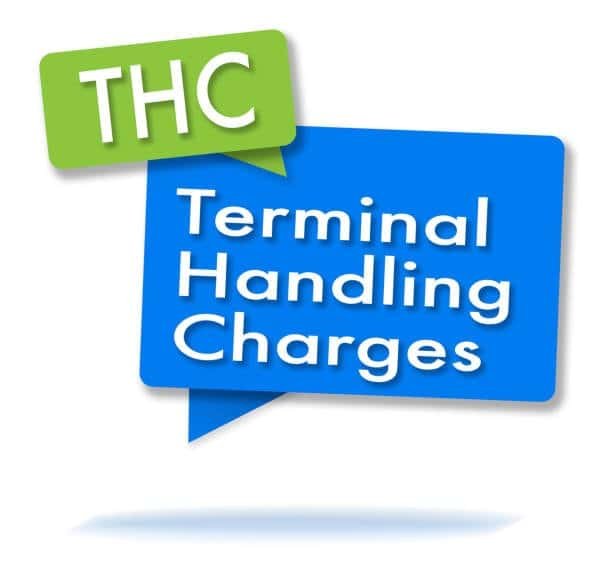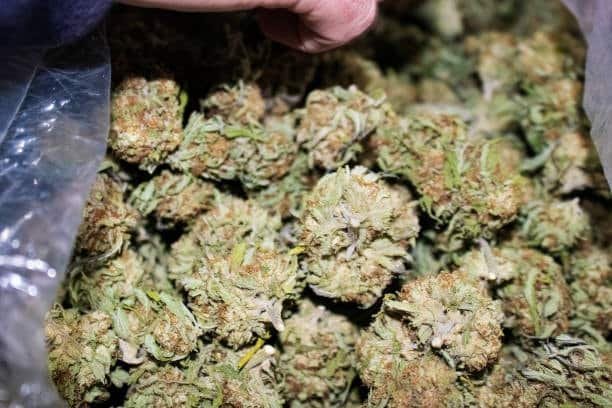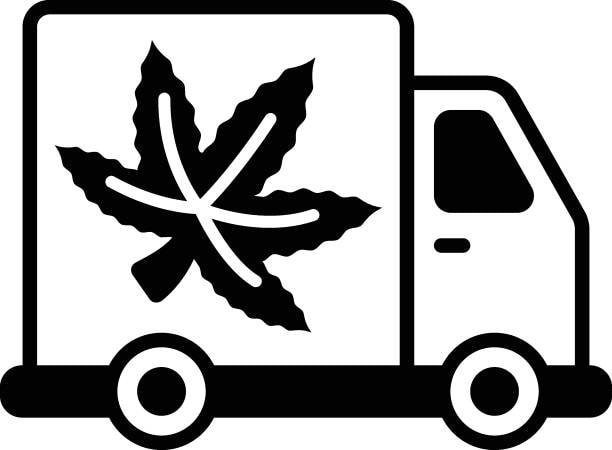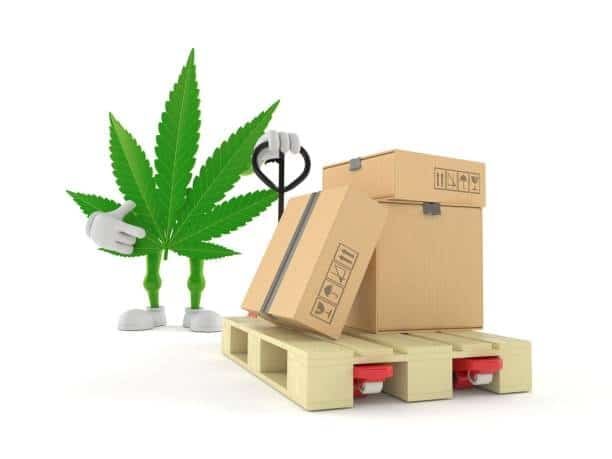THC in Logistics: How Cannabis Regulations Impact Modern Supply Chain Management
By Guanwutong / June 12, 2025
Logistics and THC (tetrahydrocannabinol) are now more complicated due to increased legalization of cannabis in various places. A key responsibility for logistics professionals, transportation companies and supply chain managers is to know the rules governing THC products for compliance, avoiding risks and taking advantage of business openings. This guide explains how THC regulations affect all parts of logistics operations, including terminal handling charges, and shares useful knowledge for people working in this sector.
Understanding THC and Its Legal Classification in Transportation

Most of the mind-altering effects from cannabis are due to a compound called THC which is the main psychoactive ingredient in these plants, impacting cargo transport significantly . The fact that THC laws are different for every jurisdiction in the country leads to special problems for the logistics involved with its products, including the challenges faced by shipping companies . The way THC products are grouped affects their suitability for travel, storage and movement along supply chains.
Logistics firms that run business in multiple states run into a main challenge because THC is still illegal under the Controlled Substances Act. State laws might allow the use of medical or recreational cannabis products containing THC, though the federal government still sees these substances as Schedule I drugs. Because of this difference, logistics businesses need to manage logistics rules that may be in conflict.
Companies dealing with THC should be aware that how strong the THC is can change its legal classification. The Farm Bill of 2018 legalized hemp products at the federal level if they have less than 0.3% THC and stricter laws apply to those that go beyond this limit. Because of this distinction, logistics professionals need to set up proper transportation, document and compliance processes, including calculating the terminal handling charge .
Federal Regulations Governing THC Transportation
Several government agencies are responsible for THC transportation, each with particular authority and duties in enforcing THC rules. The Drug Enforcement Administration mainly controls the shipping of controlled substances and the Department of Transportation regulates how commercial vehicles are operated with hazardous materials.
Federal law does not allow the transportation of THC products from one state to another, no matter if both states allow cannabis. As a result, logistics companies are forced to use distribution networks just in one state, instead of the usual national network that connects two or more states, complicating the loading proces . Logistics providers are required to maintain separate transportation networks in every state which increases how hard it is to operate and how much it costs.
The Federal Motor Carrier Safety Administration (FMCSA) requires that drivers who operate commercial vehicles have no THC detected in their systems. No matter what the laws are in specific states, these regulations still apply which makes it more complicated for transportation companies. Managers in logistics must put in place strong driver checks and appropriate testing to remain compliant with rules.
An example of problems in logistics is when businesses have to move goods across states with differing rules about cannabis use. Despite having hemp products with legal levels of THC, businesses are required to keep thorough records showing the products comply during transport. Since documentation is important, companies must have chain-of-custody records, transport manifests and compliance certificates, apart from analysis certificates.
State-Level Variations in THC Logistics Regulations

Since every state has individual laws, logistics companies have to be very careful following the different rules. States with legal cannabis have set up special rules, licensing processes and standards for transportation that directly influence how logistics happens. Awareness of these different laws is important for companies that function across multiple jurisdictions.
Most states need cannabis transportation businesses to have special permits before they can handle THC goods. License-seekers often have to go through background checks, show their finances and submit their operating plans with these licenses. Getting a license often takes months and requires regular monitoring which makes it tough for logistics companies to enter or run their businesses smoothly same port.
THC logistics operations must also ensure compliance by using state tracking systems. A majority of legal cannabis states have put into effect systems that track cannabis supplies from seed to final sale. Logistics firms should use these systems to give real-time transport information, safeguard precise records for all THC items being carried, and accurately track any fees charged.
In different places, authorities have their own requirements for transportation vehicles such as setting specific security measures, requiring GPS or deciding the way goods are stored. Since these requirements need more than routine transportation, companies have to buy special vehicles and equipment. Logistics businesses should take into account the vehicle rules in each state when coming up with plans for moving THC products.
Also, rules about routes and delivery times cause additional problems in THC logistics operations. A lot of states do not allow transporting cannabis during certain times, bar delivery close to schools or sacred places and require prior notice to police offices port terminal. They cause delivery date difficulties, route optimization issues, especially at the destination port, and scaled-down overall efficiency for logistics companies freight terminals.
Security Requirements for THC Product Transportation

They have to think about security in more detail since THC products are both valuable and legally regulated. Both following regulations and preserving inventory and driver safety benefit from having complete security measures shipping terminals.
Usually, the physical security of a convoy means all vehicles are armored or secured and use GPS tracking, alarm systems and communication devices for continuous monitoring terminal handling charges thc. A lot of places have laws in place requiring all transport vehicles to have security Features such as secure storage compartments, several locks and sealants that show if they have been tampered with. Because of these conditions, companies must invest a lot in specialized vehicles shipping line.
Proper procedures for driver and logistics staff handling THC products require full background checks. A lot of states require people handling cannabis transportation to get valid licenses, attend training programs and go through routine background checks. Because of these rules, it takes more resources and access to staff to manage THC logistics port terminals.
To comply with regulations, most cannabis markets require third-party logistics companies to have real-time tracking which includes seeing where products are, what conditions they are in and if they are secure. They have to link up with regulatory databases in each state and create thorough records for compliance reporting container terminal.
There are special guidelines in place to address anything that might cause unusual accidents, security issues or break the laws when transporting THC. Such companies should be ready with a detailed response plan, keep up with emergency communication and consult with law enforcement when safety problems come up. These procedures should often be examined and improved to guarantee effectiveness container service charges.
Supply Chain Management Challenges with THC Products

Dealing with the supply chain for THC goods comes with distinct problems aside from the usual logistics. Since these products are regulated, they must be managed using special handling methods, storage procedures, and transportation plans related to freight terminal operations, changing the way the supply chain works.
Managing THC products in inventory requires keeping detailed records from when they are grown until they are sold. Companies in logistics must keep track of how much product there is, its strength, batch codes and who handled the supply at every point in the chain. As a result, companies must buy specialized software and handle more administrative tasks container carrier calculate terminal handling charges.
Because of the need for security, controlled conditions and compliance with rules, storage for THC products is usually more involved than regular storage. Most jurisdictions ask that cannabis products are held in secure areas with special access rules, monitoring systems for the environment and systems for tracking inventories. Thus, fewer storage options are available to logistics providers, especially when influenced by the terminal operator, which makes storing shipments more expensive special handling equipment port premises.
THC products require additional testing that makes the supply chain more complex, since testing is completed at different points in the distribution chain. Logistics companies need to connect with testing labs, organize testing events and handle products designated by different regulations depending on what the tests found. It means logistics managers must understand the unloading process and bring in more resources to handle it cargo traffic.
Many traditional logistics operations can’t use cross-docking or handling multiple types of products because it’s usually not allowed or secured enough for THC products. Having these challenges makes the supply chain less efficient and often needs alternate ways of distribution that could raise costs and delivery periods trans shipment ports.
Technology Solutions for THC Logistics Compliance

Managing the complicated compliance rules for THC logistics has become simpler because of new technology. They help organizations report on regulatory matters, maintain correct records, including terminal handling charges thc, and meet requirements from many different places.
Using specialized track-and-trace systems for cannabis allows you to see every step of a product in the supply chain. They are linked to government regulatory systems, handle the reporting required and store detailed logs for permissible review. A lot of systems give access to both real-time information from workers and automatic alerts when rules are broken.
For transporting THC, GPS tracking, optimization of transport routes and keeping drivers under control are key features of fleet management technology. Many such systems have safety measures like panic buttons, the ability to connect in real time and automated system if a regulation needs to be met. Working together with state tracking systems helps companies comply and lowers the paperwork required.
When used in cannabis logistics, inventory management platforms contain rules for following laws, monitoring batches and producing reports automatically. Because of these systems, logistics companies have reliable records, can address product recalls and maintain proper tracking of documents within the supply chain. Using testing laboratories and regulatory databases with integration close gaps and lower the risk of compliance infractions.
By using data analytics and reporting, logistics companies can review how they work, find trends in complying with laws and arrange their distribution more efficiently under regulations. They are able to spot upcoming compliance problems, outline how operations can be better and give thorough reports for regulators and those involved with the business.
Risk Management and Insurance Considerations

A total approach is necessary to handle legal, process and financial risks that are present in the cannabis industry for THC logistics. Since transporting THC products involves many legal rules and specific operations, traditional risk management strategies should be changed to fit the situation.
It is important in regulatory risk management to keep track of changes in laws and regulations in different regions all the time. Such companies have to create methods for tracking new laws, understanding their requirements and adjusting their operations to Follow the latest regulations. Regular monitoring calls for having knowledgeable people and resources at hand who can handle cannabis law.
It is important to assess operational risks in THC logistics because this safeguards against security threats, product diversion and rules that could cause a criminal record or lead to the company’s license being pulled. Firms should come up with thorough approaches to risk assessment that spot dangers and use proper ways to manage them across all their activities.
Since a lot of regular insurers exclude cannabis businesses from their insurance, ensuring THC logistics can be hard. Although there are insurance policies designed for the cannabis industry, choices are few and the costs are higher than with regular logistics insurance. Businesses should study the insurance options and decide if they should manage certain risks on their own.
Planning for financial risk management includes handling banking, cash and payment issues that cannabis logistics have to deal with. Dealing with the complexities of paying and banking for THC products often means that logistics companies have to establish special ways of handling finances.
Economic Impact and Market Opportunities

THC being legalized greatly affected the logistics industry by giving rise to new markets and showing various challenges in transportation and supply chains. Knowing these things is very important for logistics providers deciding if they want to work in the cannabis market.
As additional U.S. states allow cannabis products, projections for the market size of logistics services increase. Experts believe there will be major growth in specialized transportation, warehousing and distribution services due to the growth in the cannabis industry. Because of this growth, there are more chances for logistics companies that can invest in unique features and ensure compliance.
Their involvement in cannabis logistics usually means logistics providers can demand higher rates than usual since handling THC can be complex and more demanding than other goods. Grouping with industry experts in cannabis logistics can allow companies to charge more for services and continue working with cannabis businesses who value throughout the years.
THC logistics companies must buy unique equipment, computer systems, strict guidelines for regulation and organize training for their staff. Investing a lot of resources in the beginning is common, but companies that successfully provide cannabis logistics usually enjoy reduced competition and loyal customers because of how unique these services are.
Some economic barriers that startups must overcome are the costs of complying with rules, obtaining a license and the difficulty of getting traditional funding. These obstacles mean that cannabis logistics is dominated by start-up companies, while bigger traditional logistics groups are discouraged by federal risks.
Future Trends and Industry Evolution
THC logistics going forward will depend on new laws, advances in technology and moving market trends with more cannabis legalizations. Knowing these trends is key for logistics companies looking to make long-term plans to take part in the cannabis market.
Well-organized efforts by regulators at both the state and federal levels can, in the future, make compliance much easier for THC logistics. If introduced, federal legislation could bring uniform rules, allow cannabis to move between states and simplify the logistics needed for running multi-state cannabis companies.
Using better technology for tracking, reporting and supply chain management will likely help THC logistics companies work more efficiently and save on compliance costs. Such advances in technology might make it possible for smaller logistics firms to join the cannabis industry, where just a few providers currently hold a strong position.
Based on current trends, bigger transportation and logistics companies might look for growth through acquisitions of successful cannabis logistics firms. Through consolidation, more capital and expertise could join the cannabis logistics industry and well-known logistics companies would get opportunities to enter the cannabis market.
Development of interstate commerce is the largest possible change for THC logistics. Allowing cannabis to be bought and sold between states would dramatically change the industry, giving logistics firms the chance to use well-known distribution patterns and save on costs.
Best Practices for THC Logistics Operations
Strong THC logistics operations depend on addressing compliance, efficient workflows and safety measures head-on. They ensure logistics firms can be compliant and establish sustainable business operations in the cannabis sector.
Compliance is best managed by assembling special teams, delivering frequent training and keeping thorough documentation systems. It is important for companies to develop planned procedures for handling THC products and organize regular audits to guarantee they keep up with new rules.
Getting the best results in THC logistics means having specialized machines and technology, proper training and skilled staff. It is important for companies to improve logistics skills specific to cannabis, including terminal handling, even as they remain flexible to adjust to any new changes in rules or the industry.
Passion Flower is supported in the complex cannabis industry by working with partnerships with cannabis businesses, testing labs and consultants. linking with players in the industry helps by providing important market updates, practical support and pathways to business expansion.
By using continuous improvement, companies in logistics can stay current with new rules, run their operations well and find new chances in the market. Checking performance, gathering customer views and examining operations help companies reshape their approaches and enjoy a competitive edge in the changing cannabis logistics market.
Conclusion
Due to changes in laws and increasing popularity of cannabis, the use of THC products in logistics has evolved modern supply chain management. In finance, being successful involves understanding complicated issues, investing greatly in meeting regulations and being flexible as rules change. Logistics companies that manage these struggles can acquire extra business from the growing marijuana industry and aid the creation of safe and compliant networks for THC products.
Ready to Ship?
Whether your goods fit into these categories or are something completely unique, we have a plan for it.
FAQ
In logistics and international shipping, THC stands for Terminal Handling Charges, not tetrahydrocannabinol.
These charges cover the cost of handling containers at the port terminal, such as loading, unloading, stacking, storage, and equipment use.
THC is a standard cost item on shipping invoices and applies to both import (THC Import) and export (THC Export).
THC cost is a port terminal fee charged by the terminal operator.
Calculation of Terminal Handling Charges usually depends on:
- The type of container (20GP, 40GP, 40HQ)
- Port of loading or port of discharge
- Terminal operator rates
- Additional handling (reefer, special cargo, overweight, etc.)
Most ports publish fixed THC tariffs, and freight forwarders include them in quotations or invoices as THC charges.
Payment responsibility depends on the Incoterms:
- FOB: Export THC (Origin THC) is paid by the seller, while Import THC is paid by the buyer.
- CIF/CFR: Export THC is still paid by the seller, but Import THC remains the buyer’s responsibility.
This often causes confusion because THC varies by port and terminal.
A “THC scan” in last-mile delivery tracking does NOT refer to Terminal Handling Charges.
On platforms like Meesho, Blinkit, etc., THC scan means:
- The parcel has passed a local hub scan,
- Also called Transit Hub Check or Transit Hub Confirmation.
It is simply a tracking status and unrelated to port logistics.
Although they share the same abbreviation, they refer to totally different things:
- THC (Logistics) = Terminal Handling Charges (port fees)
- THC (Cannabis) = Tetrahydrocannabinol (a psychoactive compound)
In the logistics industry, especially shipping, customs, and freight forwarders, THC only means Terminal Handling Charges.
Avoid using cannabis visuals or terms when discussing port THC, to prevent misunderstanding.
A THC surcharge is an additional fee collected to cover extra handling activities at the terminal.
It may appear when:
- Terminal increases tariffs
- Special cargo requires more labor or equipment
- Port congestion causes extra handling steps
- Carriers adjust their surcharges due to operational cost changes
It is common in LCL, FCL, and international freight invoices under names like:
- THC Charge
- Terminal Fee
- Handling Surcharge
- Destination THC / Origin THC
Ready to optimize your supply chain?


Thank you for reading!
Have questions, corrections, or better ideas? We’d love to hear from you!
We value every piece of feedback and promise to reply within 24 hours. Let's make this guide better together!
Note: Spam comments will not be published.